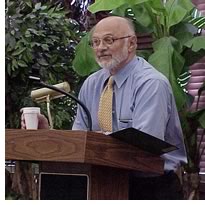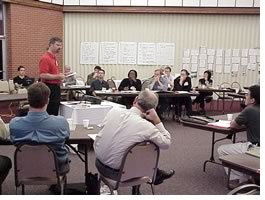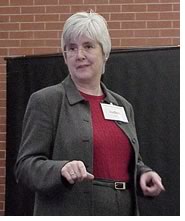
 Fifty
members of the architecture profession—including representatives
of the AIA, American Collegiate Schools of Architecture, American Institute
of Architecture Students, National Architectural Accrediting Board, National
Council of Architectural Registration Boards, and National Organization
of Minority Architecture Students—gathered in Norman, Okla., October
3–6 to evaluate the progress and challenges in internship that have
evolved since the 1999 Collateral Internship Summit. The participants
represented the broadest spectrum of the profession, from students to
senior practitioners, young professionals, educators, and, of course,
interns.
Fifty
members of the architecture profession—including representatives
of the AIA, American Collegiate Schools of Architecture, American Institute
of Architecture Students, National Architectural Accrediting Board, National
Council of Architectural Registration Boards, and National Organization
of Minority Architecture Students—gathered in Norman, Okla., October
3–6 to evaluate the progress and challenges in internship that have
evolved since the 1999 Collateral Internship Summit. The participants
represented the broadest spectrum of the profession, from students to
senior practitioners, young professionals, educators, and, of course,
interns.
The interns in attendance voiced a series of fundamental professional needs: mentorship, diversity of work experience, responsibility, respect, leadership, and clarity about the overall registration process.
 ARE
as educational tool: Summit participants unanimously affirmed the
importance of rededicating the profession to the implementation of all
nine recommendations of the Collateral Internship Task Force (CITF), formed
as a result of the 1999 Summit (see list, right). These recommendations
also served as a stepping stone for new ideas, for instance that the Architect
Registration Examination (ARE) be permitted right after graduation. Summit
participants identified the potential to use the ARE as an educational
tool in support of and concurrent with the existing internship process.
ARE
as educational tool: Summit participants unanimously affirmed the
importance of rededicating the profession to the implementation of all
nine recommendations of the Collateral Internship Task Force (CITF), formed
as a result of the 1999 Summit (see list, right). These recommendations
also served as a stepping stone for new ideas, for instance that the Architect
Registration Examination (ARE) be permitted right after graduation. Summit
participants identified the potential to use the ARE as an educational
tool in support of and concurrent with the existing internship process.
Are we developing interns or professionals?: During discussion of the Intern Development Program (IDP), established in 1979 and required for NCARB certification since 1996, Maryland intern Brian Grieb asked, "Are we developing interns, or are we developing professionals?" This question captured the participants' core concerns, and the group explicitly affirmed the importance of evolving the Intern Development Program into a "Professional Development" program.
 Validation
necessary: Participants emphasized the importance of regularly
validating the criteria and procedures for regulating professional development,
as recommended by the International Union of Architects (UIA) and currently
established in architecture education.
Validation
necessary: Participants emphasized the importance of regularly
validating the criteria and procedures for regulating professional development,
as recommended by the International Union of Architects (UIA) and currently
established in architecture education.
What next?
Over the coming months, ArchVoices,
a nonprofit think tank on architecture education and internship and organizer
of the 2002 Summit, will compile and disseminate other specific ideas
generated at the summit. In addition, using quantitative metrics developed
by the participants to measure progress towards the CITF recommendations,
ArchVoices will compile relevant data and initiate an annual national
survey of interns to understand more fully the choices, challenges, and
demographics of young people in architecture. The 2003 AIA national convention
in San Diego also has slated a session to discuss the results of this
survey and the summit in general.
Dean Bob Fillpot, FAIA, of the University of Oklahoma College of Architecture, hosted the summit, which was made possible by a generous grant from the Enkeboll Foundation for the Arts and Architecture. ArchVoices' board members Laura Lee, AIA, Carnegie Mellon University, and John Cary, Assoc. AIA, University of California, Berkeley, co-chaired the event.
Copyright 2002 The American Institute of Architects. All rights reserved.
![]()
|
Collateral Internship Task
Force (CITF) recommendations: Read the complete text of the CITF report. Find more information on ArchVoices here. For more information on the 2002 National Internship Summit, a complete list of participants, sponsors, and ongoing efforts, visit the summit Web site, send an email, or call 510-757-6213. |
|